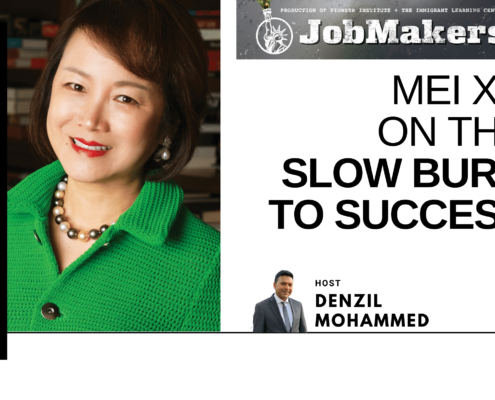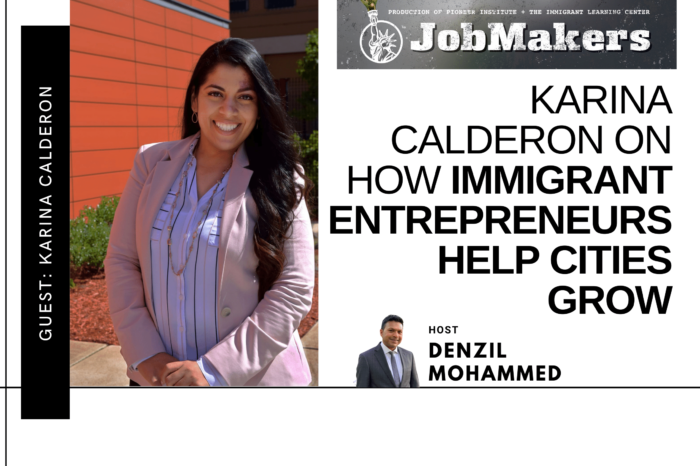Karina Calderon on How Immigrant Entrepreneurs Help Cities Grow
/in Economic Opportunity, Featured, JobMakers /by Editorial StaffThis week on JobMakers, host Denzil Mohammed talks with Karina Calderon, deputy director of The Lawrence Partnership, about her work to help immigrant entrepreneurs drive economic growth in Lawrence, Massachusetts. The Lawrence Partnership is a collaboration of business and civic leaders started in 2015 that helps by incubating, training, assisting, loaning, basically doing everything they and their partners can to grow the city’s businesses. The model they’ve adopted is replicable for sure, and is one based on longstanding relationships and trust between new and longtime residents. Karina explains how it works, shares some of the success stories of their immigrant small business owners, and details her own immigration story, as you’ll learn in this week’s JobMakers.
Guest:
 Karina Calderon, a native of the Dominican Republic, is Deputy Director of The Lawrence Partnership. She received formal training as an IT Technician and was three years into a degree as an architect at the Pontificia Universidad Católica Madre y Maestra prior to making the journey to the United States in pursuit of more opportunities for herself and her young daughter. Like so many aspiring first-generation immigrants, Karina brought with her a basic grasp of the English language, limited personal networks, and a whole lot of ambition, resilience and work ethic. Those ingredients have proven a successful combination. Karina applied her skills to the health care distribution industry, starting with Conlin’s Pharmacy and Home Medical Equipment in 2012. Karina grew with the company and ultimately helped establish a new role managing referrals and partnerships. In addition to her professional accomplishments, Karina always kept close to heart the idea that education is the key that opens all doors. While working full time and raising a family, she continued her education, gaining formal education in Computer Drafting and Design as well as a degree from the Business Transfer Associates program at Northern Essex Community College.
Karina Calderon, a native of the Dominican Republic, is Deputy Director of The Lawrence Partnership. She received formal training as an IT Technician and was three years into a degree as an architect at the Pontificia Universidad Católica Madre y Maestra prior to making the journey to the United States in pursuit of more opportunities for herself and her young daughter. Like so many aspiring first-generation immigrants, Karina brought with her a basic grasp of the English language, limited personal networks, and a whole lot of ambition, resilience and work ethic. Those ingredients have proven a successful combination. Karina applied her skills to the health care distribution industry, starting with Conlin’s Pharmacy and Home Medical Equipment in 2012. Karina grew with the company and ultimately helped establish a new role managing referrals and partnerships. In addition to her professional accomplishments, Karina always kept close to heart the idea that education is the key that opens all doors. While working full time and raising a family, she continued her education, gaining formal education in Computer Drafting and Design as well as a degree from the Business Transfer Associates program at Northern Essex Community College.
Get new episodes of JobMakers in your inbox!
Read a Transcript of This Episode
Please excuse typos.
Denzil Mohammed:
I’m Denzil Mohammed and welcome to Jobmakers.
Denzil Mohammed:
The City of Lawrence, Massachusetts is one we’ve talked about before. Why? Well, out of its 90,000 strong population, 40.8% is far born and more than 80% identify as Hispanic or Latino. According to the immigrant learning center, it has the third highest concentration of immigrants in the entire Commonwealth and its buzzing with immigrant entrepreneurs for Karina Calderon, deputy director of The Lawrence Partnership, a collaboration of business and civic leaders started in 2015 to help grow businesses in a way that benefits all its residents, that immigrant entrepreneurship is the engine driving the growth of the city. She and the Lawrence partnership are tasked with incubated training, assisting loaning, basically doing everything they and their partners can to grow the city’s businesses. The model they’ve adopted is replicable for sure. And is one based on long standing relationships and trust between new and longtime residents. Karina explains how it works, share some of the success stories of the immigrant small business owners and these hails, her own immigration story of making it in the states by herself. As you learn in this week’s job makers, Karina Calderon, deputy director of The Lawrence Partnership, how are you? Welcome to Jobmakers!
Karina Calderon:
Thank you I’m very good. Thank you. I’m very happy to be here. Thank you for the invitation.
Denzil Mohammed:
So tell us a little bit about The Lawrence Partnership. It’s a fairly new initiative and it’s all about making Lawrence bigger and brighter and better, right?
Karina Calderon:
It is for sure. So The Lawrence Partnership, it came out of a collaboration of the private sector, the public sector and also the nonprofit sector. So we have a very robust board of directors of 30 to 32 leaders, local leaders that are executive directors, presidents, CEOs of local and big companies that are here in Lawrence. They saw a need of coming together and in working towards creating an inclusive economic development for the city of Lawrence.
Denzil Mohammed:
And what does inclusive economic development look like?
Karina Calderon:
Well so we do that through different initiatives. And I can tell you a few of them. So, you know, how I told you that we have a very robust board of directors, some of them are residents of different banks in the area. And something that they did was that the, the, the bankers in our board, they came together and they invited some other banks also local to to come and put together a fund. So we can, and it was it’s called a venture loan fund. And the, the idea of this fund is to be able to provide loans to businesses, small businesses that are considered non bankable. So if a small business owner needs a loan goes to bank bank X, Y, Z, which is a huge bank and they get denied. They can go to our venture loan fund and apply for a loan there.
Karina Calderon:
And the main interest of our bankers is to inject this money into the community and help the small businesses with the needs that they have. So what they did was they each came with about a hundred thousand dollars. And right now we have a $1.1 million venture load fund. And until date, if I’m not mistaken, I know that we have learned a little bit more, but last time that I checked that I had a, an actual report, it was about $600,000 that we had put out industries to the small businesses since last summer when we relaunched the venture loan fund. So that’s a way for us to, to create that inclusive economic development. That’s one of the initiatives that it’s, that it’s big on that. Another initiative that we also have, it’s called a revolving test kitchen. It is, it started as a sh as an incubator.
Karina Calderon:
So it started as a it was a collaboration between Sal Lupoli who had a restaurant actually in our building four 20 common street Northern Essex community college, the Lawrence partnership, and also the city of Lawrence. Sal had that restaurant there. It didn’t work out for him. It wasn’t a Sal’s Pizza or anything like that. It had a different name. So then Northern Essex who rented the building, told them like, Sal, you have that space there with all that equipment, let’s do something about it. So we came together and we were able to give this space for, to a food entrepreneur that wanted to taste his recipes, test, his business plan. And we gave him the, the space for a year, so they could run it as a restaurant. They didn’t have to worry about overhead or anything like that.
Karina Calderon:
They did have to pay $500 a month, which if they, by the time that they were done with their one year period, if they opened a brick and mortar in the city of Lawrence, they would get all their money back. So we did that for three years. It was a successful program. Also let me just say that, let me just add that besides, you know, using the space and, and that help with the rent and stuff like that. They also got technical assistance. So the team from Sal Lupoli was, you know giving them some pointers and education on certain areas that they needed help with, like setting prices, you know, cost of good salt and things like that. The city facilitated them getting certain licenses that they need in order to operate their business. So it was a true collaboration. So, like I said, three years, we did that three successful businesses came out of their CocoRay’s, in south Lawrence, Encanto, who ended up opening a food truck. And then Bocaditos who decided after that she wanted to do safe surf classes is in Spanish for, for the Hispanic community. So three success stories each on their own way.
Denzil Mohammed:
This does sound very, very collaborative. And I, and when you introduce the ideas of, you know, getting licenses and permits and that kind of thing, that is, you know, especially for immigrant entrepreneurs who are not familiar with the system and need that kind of technical support, that’s really important.
Karina Calderon:
About two, three weeks ago, we had an event. We called it how to start a business and expand it in the city of Lawrence. And we were very intentional because, you know you may know that about 80, the 90% of this community is Hispanic. So we were very intentional about making this event in Spanish. And we had trans simultaneous translation services inside. So people could feel comfortable because if there’s something that is true, is that I feel like people get to trust you a little bit more when they, when you are speaking their, their same language, you know, they feel more comfortable. The walls come down, we had two panels. The first one was different business owners, local business owners talking about their experiences, giving tips, what worked for them, what didn’t, you know, things like that to inspire the entrepreneurs that were there, watching them and listening to their stories.
Karina Calderon:
So they can know that, you know, there’s a, a light at the end of the tunnel. And then the second panel, it was organizations like ours. Like I said, Mill cities, community investments entrepreneurship for all Merrimack valley planning commission, which is like a, like a Hispanic chamber type of organization. They were there. And also the city of Lawrence, they were there talking about the resources that there are available for business owners. And it’s unbelievable the lack of information that it’s out there. It’s, it’s a huge challenge. People are not aware of the resources and some resources are going untapped because not everybody has access or not even, they don’t even know about their existence. I learned about a few things there, myself.
Denzil Mohammed:
It almost seems as though immigration was a key, played a key role in the model of the partnership, because you had to rec reconcile with and recognize that their language barriers, because these are new Americans and, you know, immigrants learn English over time that it, it happens. But at the start, when they need to get a leg up speaking their own language literally is, you know, as you said, Bill’s trust, but I wanna ask this, this is happening now. You said you, the partnership started in 2014. Why did it take so long for something like this to happen,
Karina Calderon:
But you relationships, they take time to build that trust. It takes time. So I think that possibly, maybe that had a, a, a little bit of a factor. But we are not being shy now, before I remember we didn’t take credit for anything. We would do the work. We would, you know, we would work with a group of partners. We would do the work, we would roll up our sleeves, do the work, and we didn’t need to take credit. Not that we’re doing it now, but we’re just doing it a little differently because we do want people to know that the Lawrence partnership is here and it’s very important. You know, it goes back to trust that the, they don’t only know that they’re, that we’re here, but that they see that the people that say we are a team of three George Ramirez, my, the executive director myself, and then our new star Giro. And it’s important that when they see us, they see they can, they can picture cells because we look like them. We are here because we care about the community and the community. We look like them, they look like us. We are one and we are in our priority is to, to bring this community forward.
Denzil Mohammed:
And I imagine, of course, that’s not just the Hispanic community that, that you’re reaching out to. It’s, it’s everyone,
Karina Calderon:
Everyone, exactly. Everyone. And, and thankfully we can navigate, you know, in, in the different cultures. So, and, and we have partners also like, like I told you, you know, we’re not doing, we’re not necessarily doing this alone. So we’re, we’re one is slacking. The other one is compensating. So I’m not worried.
Denzil Mohammed:
And you mentioned entrepreneurship for all a really, really fantastic initiative. I see that there, even in north, Northwest Arkansas now, yes. Started by Desh Deshpande, who’s also a big legend in the Merrimack valley area, legendary entrepreneur. So what does the landscape in Lawrence look like today?
Karina Calderon:
So right now, let’s say we have a group that is working in revitalizing the downtown of Lawrence. We have Beau this beautiful flower pots on every corner, beautifying the streets. We have building owners working on the facades of, of their buildings on Essex street, trying to make it more appealing and more inviting for people to feel comfortable and come to, to, to Essex street and to Lawrence in general. We have great restaurants. So I hear some people that they say we wanna make Lawrence the mecca of food. I’m like, yeah, sure. Bring it on. Let’s make it happen. And, and we have people that are working on that. We also have huge companies local companies that are, you know, affecting the economy positively. We have Gemline, Able Womack, and then both of them in industrial park and New Balance, it’s also here in Lawrence very committed to the city and in helping it succeed.
Denzil Mohammed:
I like the idea of like a destination city for food because Malden, Massachusetts ha is that at it, it takes, we take so much pride in the fact that we have such a variety of restaurants and just so many of them, you can get pho, you can get Thai food, you can get Mexican food, everything, a new Ramen place just opened up on Pleasant street. And you talk, you talked about Essex street, which of course is like main street in Lawrence mm-hmm <affirmative> mm-hmm
Karina Calderon:
<Affirmative>.
Denzil Mohammed:
So tell me about the role of immigrants in the economic development of Lawrence overall, especially those immigrant business owners.
Karina Calderon:
I think that they are the one running the city. A lot of our businesses are immigrants, sometimes non-English speaking. And I have to, to give some kudos to our partner, Entrepreneurship for all, cuz you know, they have, they have a Spanish version of their program. And, and sometimes I’ve seen reports of the work they do and they, they would tell you so many immigrants and it’s like 93 out of hundred <laugh> mm-hmm <affirmative>, it’s, it’s a big number. And these are people that they’re hungry. You know, they want to succeed. They came here because they had a dream and they, this is the, the, the land of opportunities. That’s what I was told before I came, before I moved to this, to this country. And, and that’s how I see it. And many people see it like that. So yes, more immigrants are, the ones are the, the small, the, the small business community in Lawrence, for sure.
Denzil Mohammed:
That’s, that’s fascinating and a very, very important point. And you said that they’re hungry. They come here with a desire with a yearning, they have to succeed and they’re inherently entrepreneurial. Just the fact that they moved to another country, not knowing if it’s gonna be better or worse is itself an entrepreneurial act
Karina Calderon:
Exactly.
Denzil Mohammed:
Really inherently entrepreneurial. And I’m glad that the city of Lawrence is really capitalizing on that and optimizing it to the benefit of the entire community. And you just mentioned that you came here from another country as well. What is your impression story?
Karina Calderon:
So I am Dominican. I was born and raised in Dominican Republic. I came to spend the summer in Hampton Beach because I was in college there. I was going to architect school and they had this program where college students could come for the summer, spend the summer, work, you know, practice the language and then go back home. So I came in 2002. And then in 2002-03, my mom told me when I was getting ready to go back home, she goes, why don’t you stay and try to open doors for us. Things are a little rough here.
Denzil Mohammed:
Mm
Karina Calderon:
Mom, are you serious? Like, I don’t, I don’t have anybody here. I don’t.
Denzil Mohammed:
And she, and you’re just a kid
Karina Calderon:
22 years old.
Denzil Mohammed:
Yeah, exactly.
Karina Calderon:
But it happened at the right time because, let me tell you, if it happened to me now, I don’t think I would’ve had the same energy and the same drive. So so I stayed with some friends that I made along the way, and I, a lot of things have happened that that’s another story for another day, but I am so glad because those ups and downs that I went through, helped me to be where I am today. And this is not even my final destination just yet. There’s still much more to be done. But I am so grateful for the community that welcome me. I have no family here. It’s just me and my two daughters, but I have a great network of friends of colleagues. So I’m for what the city has done for me. And, and I think that it’s only, it’s only right, that I keep doing the same thing for the city.
Denzil Mohammed:
Perfectly said very, very well said. That’s incredible. And to think that, I mean, people take for granted how hard it is as an adult, especially to learn a whole new language, a whole new culture, all the different laws. And you’re embedded in all the licensing and credentialing and permitting and all these different things. What is a credit score? You know, what is that? So many things to learn and you I’m, I’m, I’m so pleased that you choose you chose to stay with your mother’s encouragement. Mm-Hmm and <affirmative>, how does it feel for you knowing how difficult it would’ve been back in the Dominican Republic to have your daughters grow up in Lauren? So, and in the United States,
Karina Calderon:
I feel very appreciative and very blessed. If my daughters would be here, they would be rolling their eyes. Because one thing that I used to tell them since they were very little was, and they would like verbatim and repeat, repeat it as I was saying it, because I said it so long. So, I mean, I said it so many times that I would, I used to tell them like, listen, cuz my oldest one, she was born in Dominican Republic. So, you know, immigrant, the little one was born here, but I told her like, listen, we came to this country to be the best version of ourselves to take advantage of those opportunities that they give us and work with them and be the best version of ourselves. Because back home, we didn’t have that, you know, the education we don’t, we were blessed back home, at least my family that I did have access to an education, but many people didn’t have the same luxury.
Karina Calderon:
So to come here and see that anybody, as long as they want it, they can have that education. I know that there are their challenges because you know, not everything is easy, then you have to have some skin in the game. I just told them, let you know, let’s, let’s be that let’s be the best versions that we can be. And and I’m just grateful that I, I never thought that I would end up here. Like I told you, I, I came for a summer to have fun with my friends and make some money and bring it back home and, and to end up here and make my life here and, and to live in this community that it’s home now, it’s, it’s wonderful.
Denzil Mohammed:
You’re and you’re having an impact. <Laugh>, you’re having an impact on the CF Lawrence and beyond. And I hope others, municipal workers are listening into this to, to really realize how important these partnerships and these relationships are toward a more inclusive economic situation, wherever they are. You have to get everyone’s, you know, everyone needs to be at the table, whether they’re new or old and the new tend to be that hungry, those hungry people who, who will take that risk and start to exactly and try it out and hopefully end up being successful. Karina Kran off the Lawrence partnership. Thank you so much for joining us on job makers.
Karina Calderon:
Thank you. It was a pleasure.
Denzil Mohammed:
Jobmakers is a weekly podcast about immigrant entrepreneurship and contribution produced by Pioneer Institute, a think tank in Boston, and the Immigrant Learning Center in Malden, Massachusetts, a not for profit that gives immigrants a voice. Thank you for joining us for this week’s powerful story of immigrant entrepreneurship. Remember, you can subscribe to Jobmakers on Apple podcast, Spotify, or wherever you get your podcasts. And please give us some stars. I’m Denzil Mohammed, see you next Thursday at noon for another Jobmakers.
Recent Episodes:
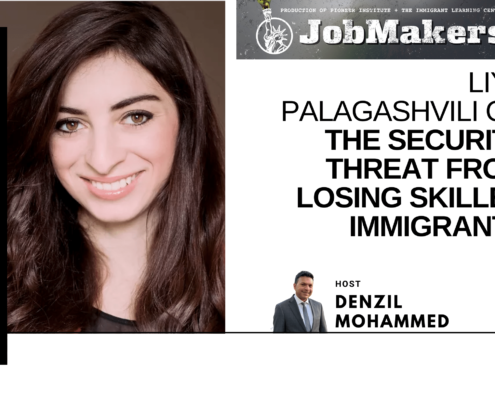
Liya Palagashvili on the Security Threat from Losing Skilled Immigrants
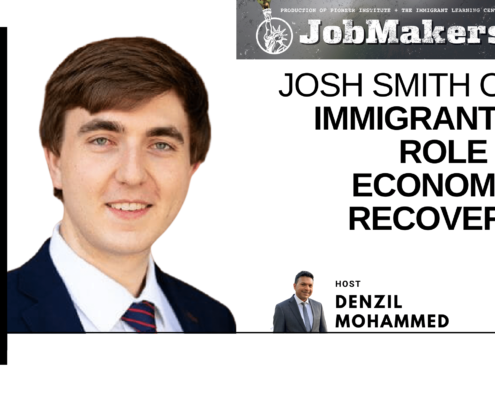
Josh Smith on Immigrants’ Role in Economic Recovery
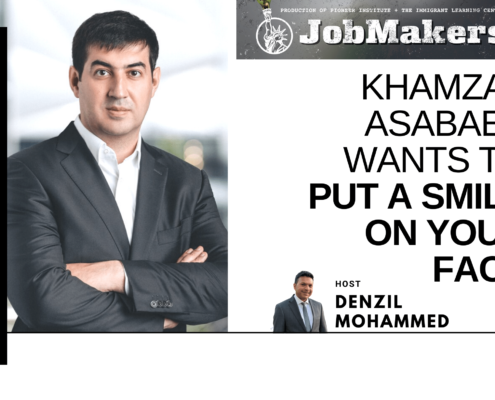
Khamzat Asabaev Wants to Put a Smile on Your Face

April Ryan Paints Her Way to Success
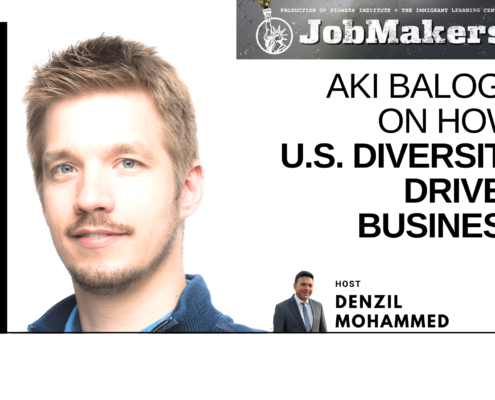
Aki Balogh on How U.S. Diversity Drives Business
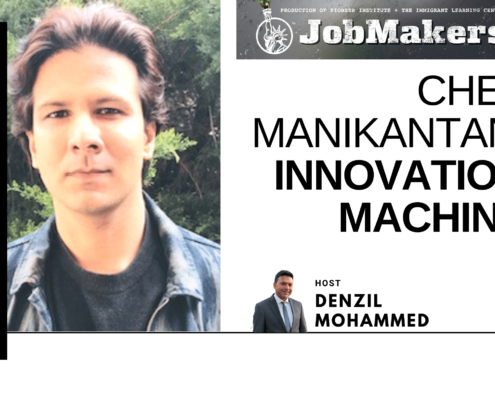
Chet Manikantan: Innovation Machine
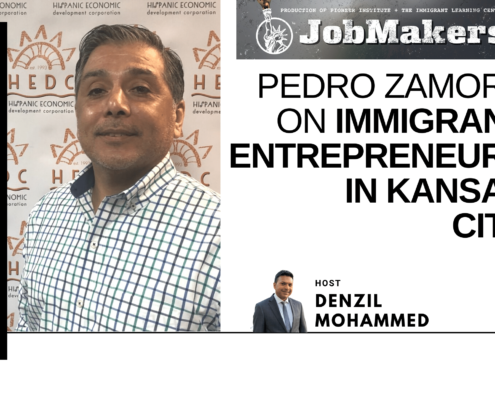
Pedro Zamora on Immigrant Entrepreneurs in Kansas City
